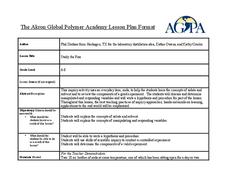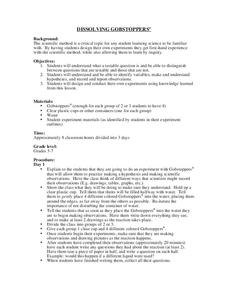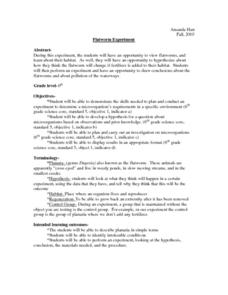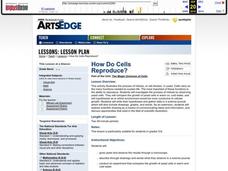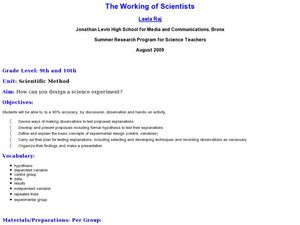Purdue University
The Case of the Pilfered Pin: A Measurement Inquiry Activity
Who pilfered the pin? Scholars practice measurement skills as they solve the mystery of a stolen pin. They measure length, temperature, and mass and determine which of select suspects committed the crime. During the STEM hands-on...
Curated OER
Study the Fizz
Students experiment to determine which bottle of soda has more dissolved carbon dioxide. In this solutions lesson plan, students use the scientific method to test the amount of carbon dioxide in bottles of soda. They identify and explain...
Curated OER
Designing An Investigation
Students will design a scientific investigation. In this engineering design lesson, students will set up an investigation, collect data and form a conclusion about bridge design. They will use common household items to construct their...
Curated OER
Beans and Birds: A Natural Selection Simulation
Students solve the following problem concerning the evolution of seed color in pinto bean plants: "How does natural selection change the frequency of genes or traits over many generations?" They use the constructivist approach to...
Curated OER
California's Golden History: 1848-1880
Using a variety of online resources, learners study life and society in California during the gold rush. They use a map to identify area where gold was located, explore pre-selected websites, describe mining practices, and create an...
Alabama Learning Exchange
Bloodstain Pattern Doesn't Lie......
An interesting instructional activity on hypothesizing about the diameter of a drop of blood that is splattered. To test their theories, learners work in groups to make blood droplets splatter from different heights. They use graphed...
Curated OER
Dissolving Gobstoppers
Learners design their own experiments . They study the scientific method and determine what a testable question is. They distinguish between questions that are testable and those that are not. They identify variables, make and understand...
Curated OER
Germs and the Importance of Washing Your Hands
Students observe what happens when bread is handled by dirty hands. They read and discuss the book "Germs." Students participate in an experiment. Students touch bread with a variation of hands: dirty, washed with soap and water, washed...
Curated OER
Exploring Seasonal Shadows and Sunlight
What can shadows tell us about the changing season? Over several months, astronomy learners record length and position of an outdoor object's shadow, such as a flagpole. They apply the data to a growing hypothesis and note the patterns...
Curated OER
Designing a Scientific Study
Students define an exploration question or hypothesis and design a scientific study to answer it. They conduct the experiment.
Curated OER
Porosity
Students investigate the concept of an aquifer and use a 2 liter bottle and other materials to conduct a simple lab experiment or demonstration. They calculate the volume of water that can be stored in the aquifer. The lab is used to...
Curated OER
Flatworm Experiment
Sixth graders participate in an experiment in which they view flatworms and hypothesize the effect fertilizer has on flatworms when it is added to their environment. Students work in groups of four or five and view a slide, under a...
Curated OER
Three-Hole Bottle
Learners participate in an experiment with a 2-liter bottle. They develop their own hypothesis about what they believe will happen when certain items are tested on the bottle. They discuss results.
Curated OER
Water Displacement
Students formulate a hypothesis using critical thinking skills. They use an orange to examine the displacement of water as the orange sinks or floats.
Curated OER
Bird Ecology Unit
Birds, plants, and vegetation, is there anything more lovely? There is! Engage your class in the scientific process, data collection, and data analysis. They stroll their campus observing and identifying various birds and plants,...
California Academy of Science
What Would Happen?
Nothing says classroom fun like an invertebrate and a magnifying glass! Snails, earthworms, and roly-poly bugs become the center of attention as pint-sized investigators hone their inquiry and observation skills. They are guided through...
Curated OER
Jumping Frogs - A Lesson on The Scientific Method
Middle schoolers use origami frogs to experience the scientific method. They define different scientific terms. Also they test a hypothesis and draw conclusions from observations to go through all the steps of the scientific method.
Curated OER
Graphing Pendulum Results
Sixth graders set up a pendulum experiment deciding which variable to manipulate (length of string or weight on the string). They create a hypothesis, collect necessary equipment, and write out each step of their experiment. They then...
Carnegie Mellon University
Lab Report
A set of instructions and a 100-point grading rubric have been designed for writing lab reports. Appropriate for middle schoolers, this lays out what to include for each of the six steps in the scientific method: title, hypothesis,...
Curated OER
Plaque Busters
Students work with the scientific method; observation, hypothesis, and experimentation. They observe the effects of decay and the need of good oral hygiene during an experiment with an apple.
Curated OER
Making a Thermometer
Students observe a demonstration of how a thermometer functions. They apply the scientific method while determining which of three cups hold the coldest water. They write a hypothesis before conducting the experiment and gather data.
Curated OER
How Do Cells Reproduce?
Beginning biologists prepare a sugar solution for yeast cells to live in, and divide it into two different jars. Samples from each jar are viewed with a microscope, and then one jar is placed in a warm environment and the other a cold...
Curated OER
The Working of Scientists
Pupils define and explain the basic concepts of experimental design. For this scientific method lesson students complete a hands on activity, develop and present proposals to test their explanations.
Curated OER
Oxygen Levels and Aquatic Plants and Animals
Students design an experiment to test the effects of a change in the amount of dissolved oxygen of water on aquatic plants and animals. Questions are offered for exploration and experiment design. Results are tabulated and conclusions...



